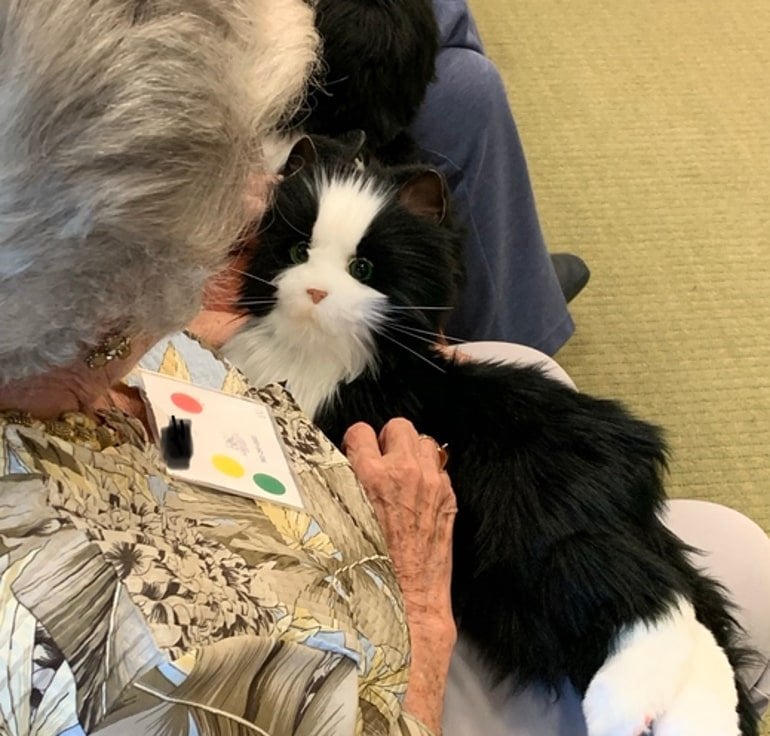Summary: Researchers report improvement in mood, behaviors, and cognition in older adults with dementia, thanks to the aid of a robotic furry companion.
Source: FAU
Individuals with Alzheimer’s disease or related dementias (ADRD) often experience behavioral and psychological symptoms such as depression, aggression and anxiety. Frequently, these symptoms are treated with antipsychotics, antidepressants and benzodiazepines, which often have side effects.
While pet therapy is known to be a cost effective and therapeutic intervention for improving mood and behavior in older adults, little is known about pet therapy in adult day centers, despite logistical advantages such as socialization and group activities.
With the help of a cuddly and “furry” companion, researchers from Florida Atlantic University’s Christine E. Lynn College of Nursing tested the effectiveness of affordable, interactive robotic pet cats to improve mood, behavior and cognition in older adults with mild to moderate dementia. The non-pharmacological intervention took place over the course of 12 visits in an adult day center. Participants were informed that their pet was a robot and not a live animal. Each of them selected a name for their cat, which was fitted with a collar and a personalized nametag.
For the study, published in the journal Issues in Mental Health Nursing, researchers assessed mood and behavioral symptoms using the Alzheimer’s Disease and Related Dementias Mood Scale, the Observed Emotion Rating Scale and the Cornell Scale for Depression in Dementia. They also assessed cognition via the Mini Mental State Examination.
Results showed that intervention with a robotic pet cat improved all mood scores over time, with significant improvements in the Observed Emotion Rating Scale and the Cornell Scale of Depression in Dementia. More than half of the participants scored higher on the Mini Mental State Examination post-test than pretest, with slight to moderate improvement in attention/calculation, language and registration. Post-test scores on the Alzheimer’s Disease and Related Dementias Mood Scale were six points higher than pretest conditions.
Researchers frequently observed study participants smiling and talking to their robotic cats and expressing sentiments such as, “the cat is looking at me like someone who listens to me and loves me.” They believed that the robotic pet was responding to their statements through meowing, turning their head or blinking their eyes and that they were having a conversation with the pet.
Several of the caregivers reported that their loved one had slept with the cat, held onto the cat when sitting or consistently played with the cat. One participant even slept with her robotic pet cat while she was hospitalized.
“Since there is no cure for dementia, our project offers a way to address symptoms naturally and without the use of pharmacological treatments, which may or may not be effective and have possible detrimental side effects,” said Bryanna Streit LaRose, D.N.P., A.P.R.N., lead author who conducted the study as a doctoral nursing student at FAU, together with co-authors Lisa Kirk Wiese, Ph.D., R.N., an associate professor and Streit LaRose’s faculty chair, and María de los Ángeles Ortega, D.N.P., A.P.R.N., a professor, director of FAU’s Louis and Anne Green Memory and Wellness Center and Streit LaRose’s community chair on the project, both within the Christine E. Lynn College of Nursing. “Our intervention was affordable, safe, and noninvasive.”
By using therapeutic pets instead of live pets, there was no concern about the safety of the pet, feeding them, taking them outside, or making sure they are up-to-date with their vaccines. In addition, there were no fears about participant safety due to possible pet aggression, allergies, tripping over them and the costs associated with caring for a live animal.
“In addition to improving mood, behaviors and cognition, these robotic pet cats provided our participants with an alternative way to express themselves,” said Wiese. “Importantly, improving overall mood and behavior in individuals with Alzheimer’s disease and related dementias may also improve quality of life for their caregivers and family members.”

The researchers also examined the relationship between the Mini Mental State Examination and subscale post-intervention scores of the Cornell Scale of Depression in Dementia, Observed Emotion Rating Scale and Alzheimer’s Disease and Related Dementias Mood Scale.
They found multiple significant and strong correlations between the 11 subscales of the Alzheimer’s Disease and Related Dementias Mood Scale and Mini Mental State Examination following the intervention. Nine categories regarding pleasant mood/behavior correlated favorably with the Mini Mental State Examination score, indicating a relationship between positive mood/behavior and increased Mini Mental State Examination scores.
“In the United States, one in three older adults dies with Alzheimer’s disease or a related dementia and there is currently no cure for the rapidly growing burden,” said Safiya George, Ph.D., dean, Christine E. Lynn College of Nursing.
“This therapeutic interactive pet intervention has proven to be a safe alternative method to improving mood and behavior in people with dementia who are attending an adult day center.”
Funding: FAU’s Christine E. Lynn College of Nursing received the 12 robotic pets for the project with assistance from an FAU Iota Xi Sigma grant and funding supplementation from Ageless Innovation.
About this robotics and dementia research news
Author: Gisele Galoustian
Source: FAU
Contact: Gisele Galoustian – FAU
Image: The image is credited to FAU
Original Research: Closed access.
“Improving Behavioral and Psychological Symptoms and Cognitive Status of Participants With Dementia Through the Use of Therapeutic Interactive Pets” by Bryanna Streit LaRose et al. Issues in Mental Health Nursing
Abstract
Improving Behavioral and Psychological Symptoms and Cognitive Status of Participants With Dementia Through the Use of Therapeutic Interactive Pets
In the US, one in three older adults die with Alzheimer’s disease or a related dementia. Currently, there is no cure for the rapidly growing burden, but there are pharmacological treatments to manage the symptoms, which lead to numerous side effects. We tested the effectiveness of a non-pharmacological therapeutic interactive pet (TIP) in improving mood/behavior and cognition among 12 persons with mild-moderate dementia attending an adult day center (ADC) over 12 visits.
Mood/behavioral symptoms were assessed using the Alzheimer’s Disease and Related Dementias Mood Scale (AD-RD), Observed Emotion Rating Scale (OERS), and the Cornell Scale for Depression in Dementia (CSDD). Cognition was assessed via Mini Mental State Examination (MMSE). Paired-sample t-tests, Pearson’s correlation, repeated measures t-test, and a post-intervention qualitative inquiry were used to examine the significance of TIP. As a result, all mood scores improved over time, with two showing significance: OERS (M = 73.7/SD = 9.6); conditions t(11) = −19.18, p<.001, and CSDD (M = 8.8/SD = 7.2); conditions t(11) = 4.12, p =.002. Over half (0.67%) scored higher on the MMSE post-test than the pretest: M = 10.7(SD = 5.5) and M = 12.2(SD = 7.1), respectively. Participants stroked and spoke often to their pets. Several family members reported participants sleeping with their pet following the program’s conclusion.
TIP proved to be a safe alternative method to improving mood/behavior in persons with dementia attending an ADC. MMSE scores also improved, although confounding factors such as inter-rater reliability and a potential endorphin effect may have impacted scores. Improving Behavioral and Psychological Symptoms and Cognitive Status of Participants with Dementia through the Use of Therapeutic Interactive Pets.







